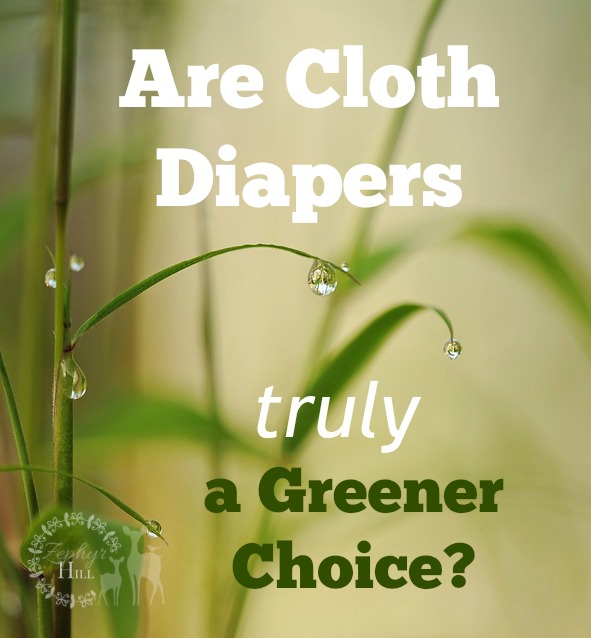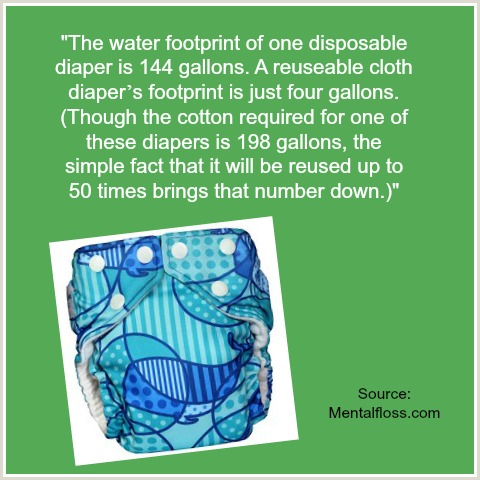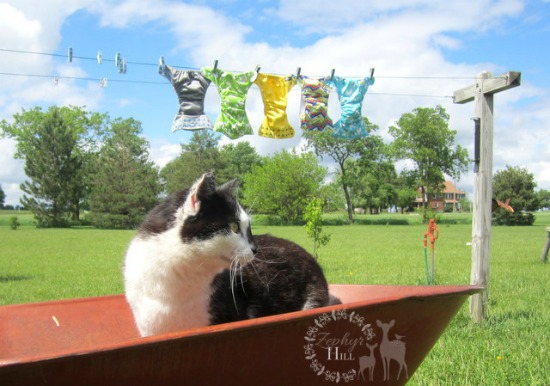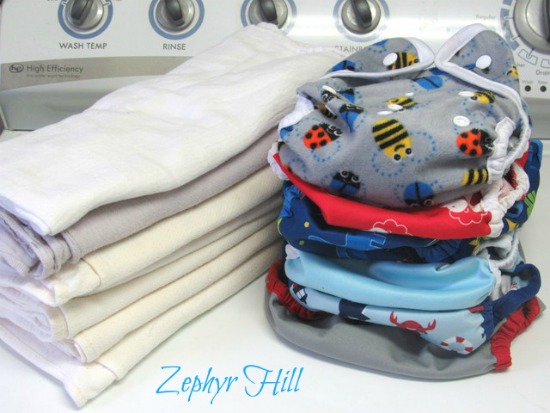
Have you ever heard someone say that cloth diapers really aren’t as “green” as people claim? After all, what about all the pesticides used to grow cotton? Or the water and energy it takes to get them clean?
I did a little bit of research to see if the environmental benefits of cloth outpace disposables.
#1 Disposable diapers require more resources and energy to manufacture than cloth diapers. This is true even when you factor in the water and energy needed to grow natural fibers and produce synthetics. Disposable diapers use 20 times more raw materials, two times more water and three times more energy to make than cloth diapers.
#2 Be careful when reading “studies” and what they claim to prove. Much of the research I looked at was flawed, or at the very least, suspect because: (1) They were commissioned by the plastics or paper industries, or sometimes by the disposable diaper industries themselves. Conflict of interest, perhaps? (2) They rely on outdated or inaccurate facts like “it takes 50 gallons of water to wash a load of diapers” (have they never heard of HE machines?) or that all cloth diaperers are using cotton or that every diaper change requires a toilet flush. (3) They completely leave out important factors like the water and energy used to manufacture disposable baby wipes or the environmental impact of disposing of them, the fact that water is a somewhat “renewable” resource, and the considerable cost in energy, time, manpower and fuel that it takes to haul disposables away in garbage trucks and then dump them at landfills.

#3 Water and energy usage is lower than you might think for cloth diapering families. Based on average figures, it costs about $0.39 per load to wash on hot and rinse on cold in the typical top loading machine, using a gas water heater. Using an electric water heater raises the average to about $0.50 per load. Drying averages about $0.35 cents per load. So for a family using a traditional top loader, washing and drying diapers 2 times a week costs about $1.48. This number will be LESS if you use a high-efficiency machine and a clothesline. You must also factor in things like periodic toilet flushes or diaper sprayer use throughout the week to wash away solid waste. So all things considered, the average family washing twice a week might see an increase of only $5.92 on their water/energy bill at the end of each month. If you wash more than twice a week it might be $9.00 or more. If you are seeing greater increases than this on your energy and water bills, it would pay to give your cloth diapering routine a closer look.

Try some of these tips to keep your costs down and offset your increased water/energy usage:
- Use a low flush toilet
- Opt for a gas heater over electric
- Try washing two big loads a week instead of three or more smaller ones.
- Use a high-efficiency washer (they spin more water out of your clothes which speeds up drying time, use up to 40% less water, less energy and less detergent)
- Always do cold rinses, and when possible, wash your other household laundry on cold (Tide makes a special formula just for cold washes). Save warm/hot settings for your diapers’ main wash.
- If your water is very hard (Diaper Junction sells a Water Hardness Test Strip for just 99 cents) consider adding Calgon Water Softener to your main wash so the detergent works more efficiently.
- Use a clothesline in good weather, or a drying rack inside your home or apartment.

- If possible, re-route your washing machine hoses so that rinse water drains outside to be collected and used for other purposes.
- Try to use less water in your household to offset the water you are using to wash diapers. Examples: Take one less shower or bath each week OR shorten each shower by 2 minutes. Don’t run the water while brushing your teeth or scrubbing dishes. Compost fruit and vegetable waste instead of running your garbage disposal. Wash fruits and veggies in a bowl with water and vinegar instead of under running water. Use a broom instead of a hose to clean your walkways and driveways. Invest in a rain barrel to collect extra water for all sorts of outside uses.
- Invest in diapers that are the easiest to clean and dry (like flat diapers and covers)

Now let me close by saying – I’m not anti-disposable diapers! My point in writing is not to make anyone feel guilty for using disposable products. We use them on occasion and appreciate the convenience they offer. In fact, that’s what makes disposable diapers so attractive – the convenience factor. We all appreciate paper napkins and paper plates on a picnic or paper towels for cleaning dog throw-up. My motivation for writing today is simply to clear up misconceptions and misinformation.
We are all called to be good steward’s of the Earth that God created. Cloth diapers are just one way to do this!

I already direct all the people I meet/hear about that are thinking or confused about cloth diapers to your site. I love the amount of info you have posted. This is a wonderful representation of the low cost of cloth diapering. Thanks!!
P.S. I’m a really new blogger and have been preparing my first post on our cloth diapering experience so far. Hopefully it will get up in the next few days (my Husband had some serious injuries this past week and I fell behind). Anyways…I added your button! Check it out : )
Sara, your comment really made my day! Thanks so much for taking time to write and let me know how helpful the blog has been. It means a lot to me! I can’t WAIT to read your first cloth diapering post! Thanks also for adding my button, and I will keep your husband’s recovery in my prayers.
All the best, Anne
This is really interesting to me because the month after I started using cloth diapers my power bill jumped by $30 as compared to previous months and last year same month. I’m not sure if that was the reason, but it was a lot. Keeping my eye on it.
That IS interesting! The jump should not be that much, if you are just washing 2 or 3 times a week and only running 1 hot cycle. The main energy cost associated with cloth diaper care is the heating of water, not the actual water itself. I know some mothers who wash on warm instead of hot with good results. You might try that. Also, if you don’t already have a gas water heater, consider that instead (or for next time, when you replace). They use less energy.
Sara’s post reminded me that I should grab your button too.
That would be great, thanks!!
Hey do in my house! We always hang dry our diapers!
Great post. People also don’t think about the cost of shipping disposable products.
Very true. All that fuel and manpower – I’ll add this point to the post, thanks! Anne
These are great tips – thanks! Reusing cloth diapers for subsequent kids or reselling/buying used diapers further reduces the environmental impact per child, besides the cost savings.
Another good point, thanks for sharing, Olivia!
I strongly believe that cloth diapers saves $ and is better for the environment! Those are great tips on how to save water in other ways since washing diapers can use a lot of extra water!
Thank you, Bekah!
Very informative! I find that washing my diapers at night and then using my drying rack that I purchased for $15 at Walmart helps cut down our energy bill at bit. I wash them at night so when I hang them to dry and go to bed they are completely dry in the morning and all I have to do is stuff them.
i am so happy i decided to cloth diaper. it saves my wallet and energy and the environment.
For us, it really started out as the potential to save money. That has turned into more of ‘environmental impact’. ULTIMATELY though, our child is allergic to a ton of foods and materials, so it saves his poor little hiney Plus, it’s super cute and I can make a fashion statement via my attention catching baby’s cute little fluffy rump, potentially causing more moms to switch to cloth and creating an even bigger environmental impact. That makes it awesome.
Plus, it’s super cute and I can make a fashion statement via my attention catching baby’s cute little fluffy rump, potentially causing more moms to switch to cloth and creating an even bigger environmental impact. That makes it awesome.
(I do line dry my diapers most of the time, much to the irritation of my apartment management team. We are a low income housing complex, afterall, what better way to put money back in our pockets and decrease the trash they have to dispose of, than by cloth diapering! LOL)
You’re brought up another good reason which is unrelated to energy and cost – health benefits! I’m glad cloth has helped your little boy. And yes, they are so cute! Having cloth diapers means you get to pick out yet another item of clothing for your child to wear! Anne
And yes, they are so cute! Having cloth diapers means you get to pick out yet another item of clothing for your child to wear! Anne
For us, I’m not sure if we’re saving money at this point, but honestly, that’s not my biggest motivating factor. We were only paying for about 1/3 of our disposables before we switched, thanks to an Amazon subscription gift. When we starting adding in cloth to the mix, I definitely saw the power bill jump, and maybe a tiny bit on the water, but mostly the power, but then it was also right as it started to get hot, so it’s really hard to tell. I think that the more often we use cloth, the bigger the saving is. But bottom line, the not throwing all that trash away, and #1 not having those chemicals on baby’s bum is the biggest thing. Also I plan to hopefully reuse them with future children so that will continue to help with savings.
You’re right – there are other reasons besides just the potential savings to try cloth – less chemicals and the fact that they are re-usable. Whether you’re talking dishes instead of paper plates or cloth instead of paper napkins, it’s good to throw away less than we have to. Anne
I think it def saves energy! Think about the manufacturing process alone and all the job and commutes that go with just making a sposie. It makes your head spin! Anyone who wants to argue that cloth diapering takes up more energy really needs a head check.
wow thanks for the insight i am going to cloth diaper my first once she is born and I had never thought about the cost of energy, VERY HELPFUL!!
Thanks for detailing the facts for cloth! I am a huge cloth advocate for anyone who is interested! I’ve not thought about the shipping costs for disposables either…Of course there are shipping costs for the cloth as well, but only once as opposed to multiple times over.
Where I live water is very inexpensive and it doesn’t cost a whole lot more to use more water. I line dry my diapers year round (inside in winter, outside in summer) as I have a big enough stash to wait for them to dry. I think it is cheaper and better for the environment. Also, I don’t know if cloth diapers is the only reason but my son potty trained very easily just before his second birthday. He is now 2.5 years and most of the other kids I know his age are still in diapers (disposable ones) so that has a big impact too.
Now that our water is included in our rent we’ll save even more money by using cloth instead of disposables. We weren’t paying a lot for disposables as a lot of them were given to us but we can’t always count on that generosity so I’m glad we can cloth diaper at least part time.
I have an HE FL and it sucks for washing diapers. I have to do two long hot washes to get them clean enough. Also, we CD 100% of the time and our water bill has gone up $30/month. Our energy bill has also gone up significantly, but it’s hard to tell how much since we are also in the middle of summer in Texas. Between that and my CD buying addiction we are definitely not saving any money. However, we made this choice for our baby’s health so it’s not a deal breaker for us.
Lily, that’s too bad about your HE machine! Sounds like it’s not doing it’s job and is causing you to use more water and energy to get your diapers clean. Also, do you have an electric or gas water heater? The latter is more efficient. Your water bill jump seems much higher than it should be; I wonder if it’s just the diapers, or if your rates were recently raised? Let me know if the numbers go down after the heat in Texas subsides. Anne
i think cloth diapering does save energy! we have not really noticed an increase in our energy bill and we have a well so we dont have a water bill! it also saves gas in my car becuase i dont have to run to the store late at night or any other inconvenient time because i never run out of diapers!!!
Very interesting article. Honestly I never really thought about the energy costs when switching to cloth as I was more concerned with the environmental impact in landfills. Now that I think about it my energy bill went up but it was also REALLY hot here so we’ve been running the AC a ton! I’ll have to check out our bill once the weather cools off an see if it’s made much difference for us. I’m thinking not much since I hang everything to dry outside and will do all year as we live in a place where that is possible.
I appreciate the emphasis on facts. I feel like I’m so often seeing either skewed “facts” on one side or “don’t you love the earth?” guilt on the other side.
What a great blog post…didn’t stop to think of the actual cost of washing diapers but it is definitely cheaper than buying disposables.
I think there’s a lot more to the environmental impact than energy use. The landfill aspect (and people’s tendency to not flush poo when using a disposable) is more troubling to me than the other aspects. But considering I live in Canada and our electricity in my province is hydroelectric, it’s much more environmentally friendly in and of itself than a coal plant.
Thanks for the great information. We’re still debating about which type of diaper to use.
this post is definitely going into my bookmarks! so much great information here, and perfect for sharing with those that are skeptical!
Thank you so much for posting this! My cousin keep saying they can’t cloth diaper because of the cost. Maybe hearing that you can from someone else will help them push more towards cloth. I am definitely sharing this!! Thank you so much again!!
You’re welcome, Beth!
We have to use a laundry mat to wash diapers. So, I am honestly not sure.
Very interesting, I truely belive that cloth diapering has a higher financial cost (disposables run me around $30/mo) but a significantly higher impact on our environment, and aren’t nearly as cute.
I think my family is a little backwards compared to most. I CD’d my first, and used disposables with my second. My oldest PT’s at 3.5 (ehhh), and my second trained herself the month she turned 2 (she just started to use the potty in the bathroom).
I really needed the convenience with my second, as we were renovating 2 homes, selling 2 homes and building a custom home and I went back to work at 5.5mo, and pumped for the baby… barely had time to do regular laundry let along a few extra loads of diapers.
Thank you for the informative post! When I first started cloth diapering, I always washed on hot/cold but noticed no difference on warm/cold.
*diapering
Do you mean you didn’t notice a difference in how clean the diapers get whether you wash in warm or on hot? If so, that’s really good to know!
I think it is good to be informed about this to make wise energy choices. So much energy is wasted and people have no idea how products are made and truly compare. Thanks.
This has a lot of really helpful tips! My personal favorite is about the hard water! I definitely need to invest in some Calgon Water Softener!!
I’m so glad you posted this. I’ve been getting a lot of flack for my plan to cloth diaper (when baby comes in 2 weeks!), and this is one of the first arguments I hear against it! Linking on my FB for naysayers…
It seems that the extra charge for water would be so negligible anyway.
It would be terribly annoying if cloth diapers were actually worse overall for the environment because they definitely take more work. I hope my efforts to keep a landfill not quite as full are not in vain
These are such great tips! I love wet bags and I do wash large loads rather than small. It’s much easier than having a garbage bag stinking up the garage or backyard because it’s full of dirty disposable diapers! As a child, my parents had to use cloth diapers because I had and still have incredibly sensitive skin and I was strangely allergic to diapers. I, being cautious, use cloth diapers on my son, just in case his skin is sensitive too. It feels great knowing all the good I am doing using cloth rather than disposable
Thanks for all this info! I just forwarded it to my cousin and two best friends who are contemplating CD’ing.
Thank you for so much info! My husband and I are starting to think about starting a family, and we have decided on cloth diapers. A big reason for us is to simply generate less garbage, but I hadn’t really considered which was more cost effective. I guess an HE machine will be on our list of items to buy when we purchase our house soon (as well as a clothesline)
The debate over the environmental impact of cloth diapers versus disposables is indeed complex, with valid points on both sides. While cloth diapers may require water and energy for laundering, they offer significant advantages in terms of reduced waste generation and decreased reliance on non-renewable resources. Additionally, advancements in eco-friendly fabrics and washing techniques have mitigated some of the environmental concerns associated with cloth diapers. Ultimately, the environmental benefits of cloth diapers often outweigh those of disposables when considering their long-term use and potential for reuse. It’s essential to weigh all factors carefully and make informed decisions based on individual circumstances and priorities.